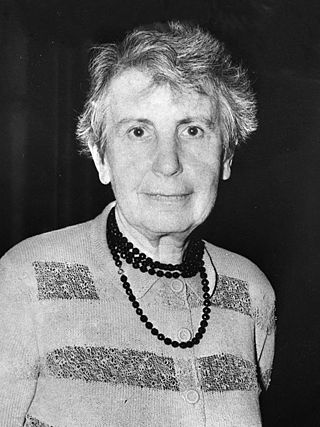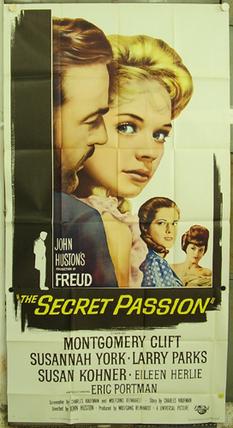
Sigmund Freud was an Austrian neurologist and the founder of psychoanalysis, a clinical method for evaluating and treating pathologies seen as originating from conflicts in the psyche, through dialogue between patient and psychoanalyst, and the distinctive theory of mind and human agency derived from it.
Psychoanalytic theory is the theory of personality organization and the dynamics of personality development relating to the practice of psychoanalysis, a clinical method for treating psychopathology. First laid out by Sigmund Freud in the late 19th century, psychoanalytic theory has undergone many refinements since his work. The psychoanalytic theory came to full prominence in the last third of the twentieth century as part of the flow of critical discourse regarding psychological treatments after the 1960s, long after Freud's death in 1939. Freud had ceased his analysis of the brain and his physiological studies and shifted his focus to the study of the psyche, and on treatment using free association and the phenomena of transference. His study emphasized the recognition of childhood events that could influence the mental functioning of adults. His examination of the genetic and then the developmental aspects gave the psychoanalytic theory its characteristics.

Anna Freud CBE was a British psychoanalyst of Austrian–Jewish descent. She was born in Vienna, the sixth and youngest child of Sigmund Freud and Martha Bernays. She followed the path of her father and contributed to the field of psychoanalysis. Alongside Hermine Hug-Hellmuth and Melanie Klein, she may be considered the founder of psychoanalytic child psychology.
Free association is the expression of the content of consciousness without censorship as an aid in gaining access to unconscious processes. The technique is used in psychoanalysis which was originally devised by Sigmund Freud out of the hypnotic method of his mentor and colleague, Josef Breuer.

Lou Andreas-Salomé was a Russian-born psychoanalyst and a well-traveled author, narrator, and essayist from a French Huguenot-German family. Her diverse intellectual interests led to friendships with a broad array of distinguished thinkers, including Friedrich Nietzsche, Sigmund Freud, Paul Rée, and Rainer Maria Rilke.

In psychology, sublimation is a mature type of defense mechanism, in which socially unacceptable impulses or idealizations are transformed into socially acceptable actions or behavior, possibly resulting in a long-term conversion of the initial impulse.

Armand Anthony Assante Jr. is an American actor. He played mobster John Gotti in the 1996 HBO television film Gotti, Odysseus in the 1997 miniseries adaptation of Homer's The Odyssey, Nietzsche in When Nietzsche Wept, and Mickey Spillane's Mike Hammer in 1982's I, the Jury. He's been nominated for two Primetime Emmy Awards, four Golden Globe Awards, and two Screen Actors Guild Awards.

Josef Breuer was an Austrian physician who made discoveries in neurophysiology, and whose work during the 1880s with his patient Bertha Pappenheim, known as Anna O., developed the talking cure which was used as the basis of psychoanalysis as developed by his protégé Sigmund Freud.

Pierre Marie Félix Janet was a pioneering French psychologist, physician, philosopher, and psychotherapist in the field of dissociation and traumatic memory.
The Talking Cure and chimney sweeping were terms Bertha Pappenheim, known in case studies by the alias Anna O., used for the verbal therapy given to her by Josef Breuer. They were first published in Studies on Hysteria (1895).

Studies on Hysteria is an 1895 book by Sigmund Freud, the founder of psychoanalysis, and the physician Josef Breuer. It consists of a joint introductory paper ; followed by five individual studies of hysterics – Breuer's famous case of Anna O., seminal for the development of psychoanalysis, and four more by Freud— including his evaluation of Emmy von N— and finishing with a theoretical essay by Breuer and a more practice-oriented one on therapy by Freud.

Two Essays on Analytical Psychology is volume 7 of The Collected Works of C. G. Jung, presenting the core of Carl Jung's views about psychology. Known as one of the best introductions to Jung's work, the volumes includes the essays "The Relations between the Ego and the Unconscious" and "On the Psychology of the Unconscious" (1943).

Irvin David Yalom is an American existential psychiatrist who is emeritus professor of psychiatry at Stanford University, as well as author of both fiction and nonfiction.

Freud: The Secret Passion, or simply Freud, is a 1962 American biographical drama film directed by John Huston and produced by Wolfgang Reinhardt. Based on the life of Austrian neurologist Sigmund Freud, it stars Montgomery Clift as Freud and Susannah York as his patient Cecily Koertner. Other cast members include Larry Parks, Susan Kohner, Eileen Herlie, Eric Portman, and David McCallum. The screenplay was by Charles Kaufman and Reinhardt, with some elements from a script by Jean-Paul Sartre, who withdrew his name from the film.

Bertha Pappenheim was an Austrian-Jewish feminist, a social pioneer, and the founder of the Jewish Women's Association. Under the pseudonym Anna O., she was also one of Josef Breuer's best-documented patients because of Sigmund Freud's writing on Breuer's case.

When Nietzsche Wept is a 2007 American art drama film directed by Pinchas Perry and starring Armand Assante, Ben Cross and Katheryn Winnick. It is based on the novel of the same name by Irvin D. Yalom. It was filmed in Bulgaria.

Freud, also known as Freud: the Life of a Dream, (1984) is a BBC television serial based on the life and times of Austrian psychoanalyst Sigmund Freud. David Suchet stars as Freud. The 6-part production is 360 minutes in duration.

Freud, Biologist of the Mind: Beyond the Psychoanalytic Legend is a 1979 biography of Sigmund Freud, the founder of psychoanalysis, by the psychologist Frank Sulloway.

Freud is an Austrian-German crime thriller television series re-imagining the life of a young Sigmund Freud. The series produced 8 episodes which were first aired on ORF 15 March 2020 then released on Netflix on 23 March 2020.
















